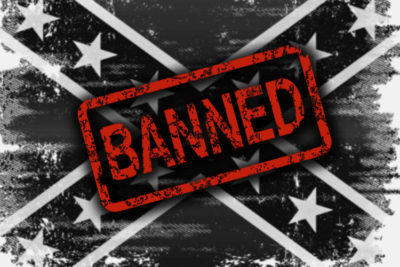Organizers of Wisconsin’s Vernon County Fair are appeasing the few to the chagrin of many.
 The 11-member board that oversees the nonprofit voted last month to ban vendors from selling the Confederate flag at this year’s event – slated for Sept. 13-17 – and it’s not going over very well, the La Crosse Tribune reports.
The 11-member board that oversees the nonprofit voted last month to ban vendors from selling the Confederate flag at this year’s event – slated for Sept. 13-17 – and it’s not going over very well, the La Crosse Tribune reports.
“As a board, we decided it wasn’t a necessary item,” board vice president John McCelland Jr. said. “It’s a piece of our history, but someone got their feeling hurt. So we decided not to sell it.”
McCelland told the news site the board has received a flood of complaints about the decision, which was based on an altercation between a vendor and local resident at last year’s fair.
“Last year, local resident Mark Kastel approached a vendor at the fair whose goods included the Confederate flag, Kastel said. When he confronted the vendor for selling the flag, Kastel said the vendor became intimidating and began cursing,” the Tribune reports.
“It angers me personally because I consider (the Confederate battle flag) a symbol of hate,” Kastel said. “Family members of mine who were active in the Civil Rights Movement were beaten up in the past.”
“I just don’t have a lot of sympathy for people who claim that (the Confederate battle flag) is some important part of their heritage,” he told the Vernon County Broadcaster. “I’m asking the board to be conciliatory to everybody in the community. Even if there is one person negatively affected by this, that’s too many.”
Those who are negatively affected by the ban are apparently of less concern.
Kastel filed a police report about the altercation last year, which he used to push the Fair Board to ban the flag for the 2017 event.
He argued that because the Vernon County Fair receives county funding, it’s a public event that should cater to the sensibilities of all area residents.
McClelland contends the Confederate flag is more closely associated with the 1970s television show “The Dukes of Hazzard” than bigotry or slavery, and Kastel said many board members were not excited about banning the symbol, though they ultimately relented.
“It goes both ways,” McClelland said. “You make two people happy and 50 people get angry.”
The move, of course, is part of a much larger trend of municipalities scrubbing all references from the Old South from public life that gained momentum following a racially motivated church shooting in South Carolina in 2015.
The racist gunman killed nine black parishioners at the Emanuel African Methodist Episcopal Church in downtown Charleston. He also liked to pose with the Confederate flag on Facebook.
In the years since, social justice crusaders and others have forced South Carolina to remove the flag from the Capitol, successfully petitioned schools and cities to remove monuments and rename schools honoring the Confederacy, and desecrated the graves of Confederate soldiers in numerous states.
Most recently, New Orleans officials removed a 16-foot bronze statue of Gen. Robert E. Lee and sparked a citywide feud between social justice warriors and Confederate supporters.
Numerous other cities are also considering the same move, including the removal of a Confederate War Memorial in Bradenton, Florida to make room for a monument honoring Snooty the Manatee, the American Mirror previously reported.
Leave a Comment
COMMENTS POLICY: We have no tolerance for messages of violence, racism, vulgarity, obscenity or other such discourteous behavior. Thank you for contributing to a respectful and useful online dialogue.